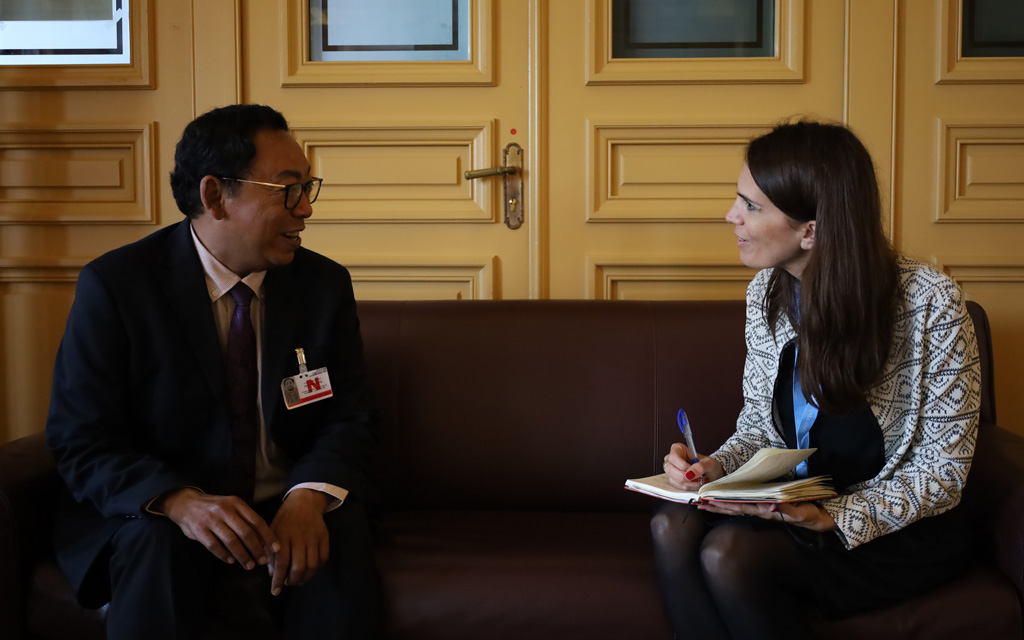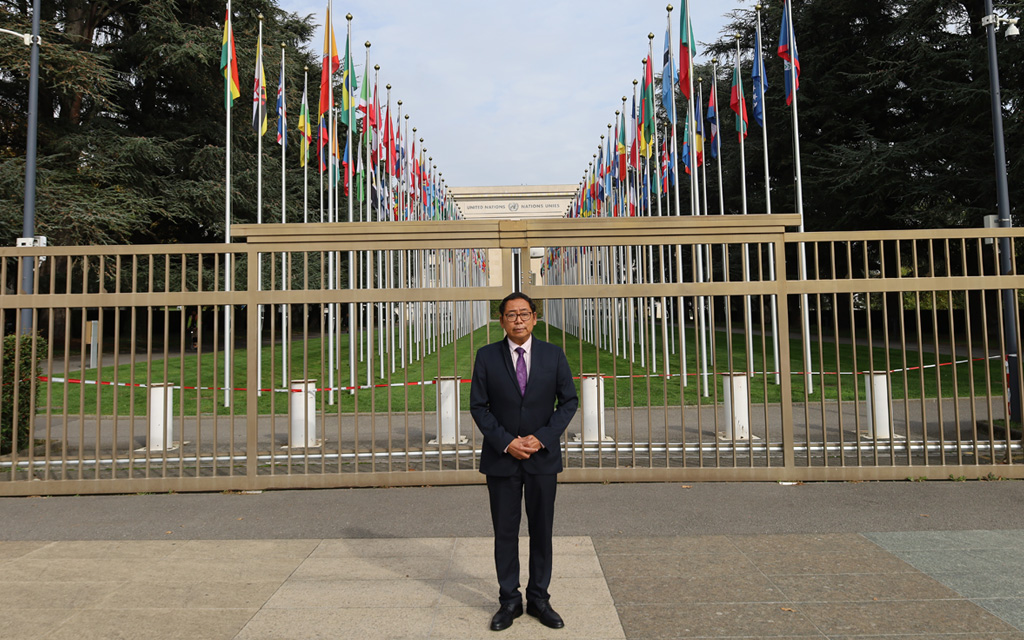Myanmar: "This is time for the Human Rights Council to take more concrete actions"
Interview with Mr. Aung Myo Min, National Unity Government (NUG)’s Minister of Human Rights
.jpg)
Interview with Mr. Aung Myo Min, National Unity Government (NUG)’s Minister of Human Rights
.jpg)
The main task of the NUG’s Ministry of Human Rights is to protect the rights of people in Myanmar. As a government, our responsibility is to respect, protect and fulfill our people, without any discriminations. Given the crisis my country finds itself in, currently our priority is to stop violations by the military. At the same time, we are working on documenting the human rights violations done by the military with the aim of taking them in front of the international community, hoping for international actions at the individual State level, at the level of regional groups as well as at the UN level. In our work, we are also making sure the policies, practices and programmes of the NUG are in line with the existing international human rights standards.
 CCPR Centre's Communications Officer interviews Minister Aung Myo Min at Palais Wilson
CCPR Centre's Communications Officer interviews Minister Aung Myo Min at Palais Wilson
Myanmar has not been a signatory of the International Covenant on Civil and Political Rights (ICCPR) and some other important human rights Treaties. We have been advocating since the previous government to ratify ICCPR and to respect civil and political rights for everyone in the country, but it failed to do so. Now, the NUG is very committed to ratify the ICCPR as well as the Convention against Torture as soon as possible and we have sent our deep commitment on the anniversary of the ICCPR on the 16th of December 2022. In our statement published on that occasion we say that we are willing to ratify it as soon as possible. This will represent a significant step towards strengthening the protection of human rights in Myanmar and building a more equal society. Therefore, we would like to call up on the United Nations to recognize and acknowledge the NUG ratification of these treaties. By acknowledging the ratification the UN can help to further strengthening the protection of human rights in Myanmar and contribute to the creation of a brighter future for all people in Myanmar.
Unfortunately and sadly, the human rights situation in Myanmar is deteriorating and getting worse day by day, with increasing violations by the military. As we all know, the military first started with the brutal repression of peaceful demonstrations right after the attempted coup, but then the situation got even worse later on, with the military now deliberating targeting the civilians in many parts of the country. Violations committed by the military include attacks on civilian, destruction of properties – with houses and in some cases entire villages being burned down -, extrajudicial killings, torture, enforced disappearances etc.
So, I would say that the current situation is going beyond human rights violations, it constitutes crimes against humanity and war crimes. I would say crimes against humanity because this is not an individual act of the military, it is done with the real purpose of attacking civilians and comes from the order of military leaders. In total, 40,000 houses were burned down and more than 2,700 people were killed, so this is widespread and systematic this is why I claims this is crimes against humanity. And it is also war crimes because the situation in many parts of the country are conflict and armed conflict situations. So, to summarize, we are seeing an armed conflict situation, with the military deliberating attacking civilians and cutting all supplies to the local people.
What we are currently seeing in Myanmar is a complicated and complex situation of human rights violations. Previous resolutions, like the one on Rohingyas, made a huge list of these violations. But what we need now is concrete calls and concrete actions, stronger economic sanctions for the military, a more effective arms embargo – including warfare technologies – and the possibility to investigate human rights violations through the existing international human rights mechanisms. The resolution should also call for the immediate cessations of all attacks against civilian, the release of prisoners and the delivery of efficient and cross-border humanitarian assistance to people in need.
Myanmar is under the agenda of every HRC. Myanmar sessions or updates by the Myanmar SR, by the IIMM or even the OHCHR always take place. And these interventions give information on the human rights situation in the country. At every session, the Council makes a strong call for coordinate global actions to stop the human rights violations. However, if resolutions come up, there is no concrete follow-up actions. So, it is time for the HRC to review the recommendations they made, make them stronger, and actually implement them to prevent further human rights violations from happening. This is time to take more actions, more CONCRETE actions, based on the lessons learned during previous sessions of the Council.
The situation and the crisis of Myanmar it is not a national crisis, it is a regional crisis, negatively affecting the ASEAN. It is also an international crisis because it affects the world peace order and represents a threat for the security of human beings.
The ASEAN should make stronger efforts to bring about concrete change, together with the international community. ASEAN plays an especially significant role, because they are neighboring countries but, so far, what they have done and achieved is very limited. The military in Myanmar sadly know how to play with ASEAN, they know that the actions by the ASEAN are not strong enough. If you notice, every time ASEAN makes a statement it is responded with a more cruel and brutal suppression on people. So, ASEAN should admit that its 5-points consensus is not actually working. They should also realize they should not work alone, but cooperate hand in hand with the international community, which can bring more pressure and trigger more decisive actions towards the military, including stronger economic sanctions and an effective arms embargo.
 Minister Aung Myo Min stands in front of the UN building in Geneva
Minister Aung Myo Min stands in front of the UN building in Geneva
As I previously mentioned, Myanmar is currently suffering a human rights crisis as well as a humanitarian crisis. Myanmar people do their best to defend their rights and fight against the military, but international intervention is much needed to stop the current crimes, utilizing all the existing human rights and international accountability mechanisms. I have been personally engaging with the HRC as well as with other UN human rights mechanisms, but what I realize is that the engagement of the various TBs is not as strong as the one from the HRC.
If you have a closer look at the situation on the ground, most violations that are currently taking place in Myanmar affects civil and political rights. From extrajudicial killings to the lack of legal rights to torture, they are all rights covered by the ICCPR. So, of course, as you mentioned, Myanmar have not ratified the ICCPR, but civil and political rights are cross-cutting and many of them could be covered by other Treaties that have instead been ratified by Myanmar, such as the International Convention on the Elimination of all Forms of Discrimination against Women (CEDAW), the International Convention on the Rights of the Child (CRC) and the International Convention on the Rights of People with Disabilities (ICRPD). This can allow us to identify the linkages between the rights included in these conventions and the ones included in the ICCPR, allowing for an extended scope of action (covering, for instance, violations of women’s civil and political rights or all life threats against children). Under this lens, cases of violations of civil and political rights could be considered under other Committees for further action.
I would say that there are three likely scenarios. The best one is that the people movement, under the leadership of the NUG and other organizations, manages to defeat the military and to bring justice back to the people, through existing international accountability mechanisms. The second one is that of a long-time struggle, with NUG continuing its diplomatic battle to motivate the international community on one-side and the people on the ground on the other-side. The third and worse scenario is the one that sees the military using all tricky and canny strategies to be recognized as the legitimate power.
Of course, the first scenario is the best one we are looking for, and we trust the people inside of Myanmar who are fighting every day and sacrificing their life to bring back democracy and the rule of law in their country. But we also need international attention and action to support the people movement inside the country.
The position of Minister of Human Rights is part of the government, but when I made the first declaration following my appointment, I clearly stated that my Ministry is not for the mouthpiece of the government. I have a responsibility for the protection and promotion of the people and do the best for the sake of human rights principles for everyone, not just for the government.
I never thought me becoming part of the government. In a “normal” situation, this would have never been my choice. But in a similar situation, when your people are suffering so much, if you really care and love the country you should be ready to serve, especially in the desperate situations. If I would have said say no, my life would be easier, for sure, but I would be guilty not to take this kind of responsibility for my people.